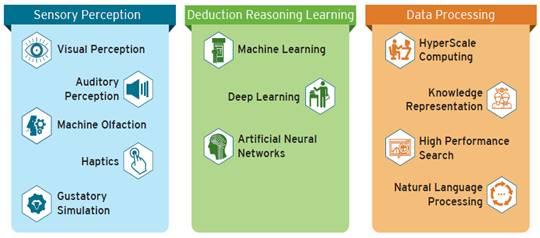Cognitive Computing: 5 Advantages and 3 Disadvantages
Advertisement
Introduction: Cognitive computing is an evolving field within computer science focused on creating computer systems that can behave, think and interact in a human like manner.
Key points
- These systems are designed to mimic human senses like sight, hearing, taste, smell, and touch.
- Cognitive computing isn’t a single, standalone technology; rather, it’s a combination of various technologies, including machine learning, machine reasoning, natural language processing, speech recognition, computer vision, and HCI (Human-Computer Interaction).
- The technology is built to collaborate with humans. Individuals nurture these systems by providing them with more information.
- Typical applications include cognitive assistants for doctors, automated data scientists, and robo-advisors for wealth management.

Cognitive computing layers, Image courtesy: Cognizant
A cognitive computing system should meet the following criteria:
- Adaptive: It should learn as information changes and as goals/requirements evolve.
- Interactive: It should allow users to interact in ways similar to human-to-human interaction, using touch, voice, gestures, natural language, and so on.
- Iterative and Stateful: When requirements are unclear, the system should ask appropriate questions to define the problem statement.
- Contextual: It should identify and extract information such as user details, location, time, syntax, etc.
The system operates based on sensory inputs and structured/unstructured data sources. Sensory inputs include speech, visuals, and gestures. It should process and analyze both real-time and near real-time data.
Advantages of Cognitive Computing
Following are some of the benefits of cognitive computing.
- Improved Customer Engagement and Service: Cognitive applications like cognitive assistants, social intelligence tools, personalized recommendations, and behavioral predictions enhance customer experience.
- Enhanced Employee Productivity and Quality: Cognitive computing helps employees work more efficiently and improve the quality of service/product outcomes.
- Unlocking Business Opportunities: Every second, each person on Earth generates 1.7 MB of data. However, around 99.5% of this data remains unanalyzed. Analyzing this data can unlock many business opportunities by identifying the right markets, new customer segments, and new products to launch.
- Increased Operational Efficiency: Enterprises can improve operational efficiency by implementing cognitive applications such as predictive asset maintenance and automated replenishment systems.
- Accurate Data Analysis: Cognitive systems are employed in the healthcare industry because they provide very accurate data analysis.
Disadvantages of Cognitive Computing
Following are some of the drawbacks of cognitive computing:
- Security Concerns: Security is a major concern, as digital devices manage critical information in cognitive computing.
- Voluntary Adoption: Gaining widespread adoption by enterprises, governments, and individuals is a hurdle.
- Change Management Challenges: This technology learns and behaves like humans, which can lead to fear that machines will replace humans in the future.
Conclusion: In summary, cognitive computing represents a significant advancement in artificial intelligence, enabling systems to mimic human thought processes, learn from data and assist in complex decision making. Its advantages include enhanced data analysis, improved automation and support for personalized user experiences. However, challenges such as high implementation costs, data privacy concerns and the need for large volumes of quality data must be addressed. Despite these drawbacks, cognitive computing holds immense potential to transform industries by making systems smarter, more adaptive and capable of handling unstructured information effectively.
Advertisement
 RF
RF




